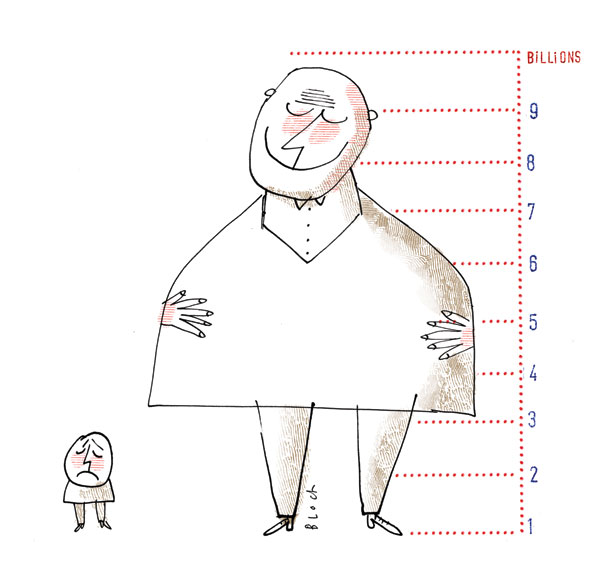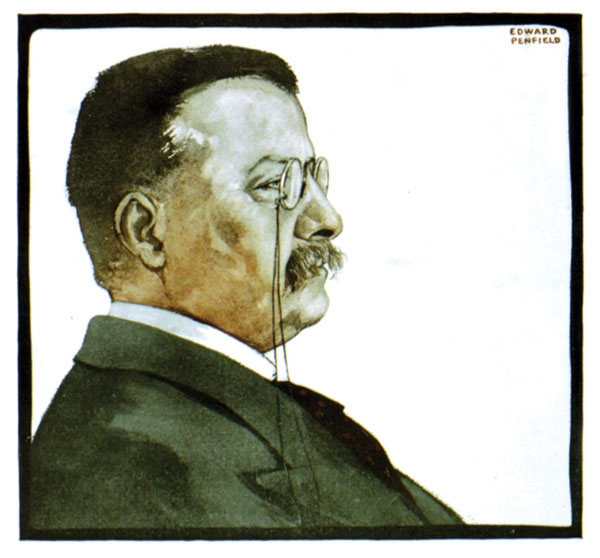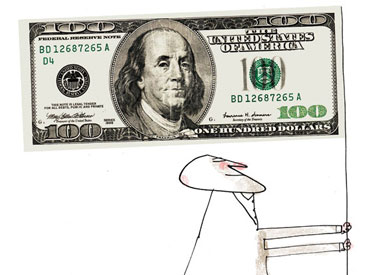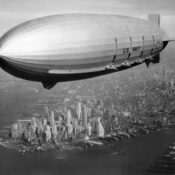
If there was ever a period when prosperity and political power seemed truly to be shared by people at every economic level, it was in the years from the end of World War II through the 1960s. With Europe and Russia rebuilding from ruins, the U.S. was the single dominant world power, and it showed in our widespread prosperity. The number of millionaires more than tripled, but unlike in more recent years, everyone else got richer, too. The average family’s real income went up 30 percent between 1960 and 1968; today, the typical male worker makes no more than he did 30 years ago. In 1949, the top 1 percent of Americans controlled 27.1 percent of American wealth. Today their share has risen to 40 percent. We hear these numbers a lot these days, so let’s paint a more vivid picture: The net worth of the six heirs to the Wal-Mart fortune alone is now worth more than the entire net worth of the bottom 30 percent of American society—many of whom have a negative net worth. A chasm in wealth has opened, and so has one in political power.
The savings of ordinary Americans was battered by the inflation of the 1970s, but it was in the 1980s that the economic landscape began to change to overwhelmingly favor the very rich. Two big things happened then. The first was the ascendance of supply-side economics, the theory embraced by President Ronald Reagan that the more you cut taxes, the more tax revenue you’ll bring in. The idea was simple: Cutting taxes, especially at the top, would spark such economic growth that people’s incomes would rise even faster than their tax rates would fall. In effect, the wealth of the richest would “trickle down” to the rest of us.
As the Reagan plan went into effect, between 1981 and 1986 the top income tax bracket fell from 70 percent to 28 percent. In a decade, the wealth held by the top 1 percent almost doubled.
The second big change was the financialization of America. By the mid-1990s finance, insurance, and real estate had become a bigger part of the economy than its manufacturing base. The go-go spirit of the time was summed up by Gordon Gekko, the hero of the 1987 movie Wall Street, when he proclaimed that “Greed … is good. Greed is right. Greed works.”
Between 1977 and 1999, the average after-tax income of the bottom fifth of the population declined from $10,000 to $8,800; that of the next fifth went down from $22,100 to $20,000. For the top fifth, it went up from $74,000 to $102,300, and for the top 1 percent it more than doubled. In 1986, the most money made on Wall Street was $125 million by the head of Lazard Freres (now known as Lazard Ltd). By 1996, it was $800 million by the business magnate George Soros.
Pumping all that cash into politics got a lot easier in the 1990s with the rise of “soft money.” Rich individuals, corporations, and unions began giving virtually unlimited contributions to the two major parties. In 2000, that added up to $450 million. In response, the Bipartisan Campaign Reform Act, passed in 2002, stopped the soft money that went straight to campaigns—but the money just found a new destination, shadowy organizations called 527s and social-welfare groups. Those organizations couldn’t explicitly endorse candidates, but they could do pretty much anything else. They included outfits like Swift Boat Veterans for Truth, which received several multimillion-dollar contributions from individuals and spent them defeating John Kerry’s 2004 presidential candidacy, and organizations on the other side to which the billionaire George Soros gave $27.5 million the same year.
In 2008 Barack Obama, a longtime proponent of campaign-finance reform, did so well at raising funds that he broke a pledge and renounced public financing, so that there would be no limit on his fundraising. He spent a record $745 million winning the presidency. Then in 2010 came the Supreme Court’s notorious Citizens United v. Federal Election Commission decision. That ruled that there could be no limit on “independent expenditures,” for they amounted to “political speech” protected by the First Amendment. As a result of that, the super PAC was born. The amount of outside money spent on presidential elections went up 164 percent between 2004 and 2008 and another 135 percent by 2012.
That all happened against a backdrop of a Great Recession and a bailout of big banks. It seemed as though the richest were let off easiest—no head of a major bank went to prison after all the wrongdoing that led to the crash—while everyone else paid the bill, rescuing banks with their taxpayer dollars and getting no assistance on their mortgages that Wall Street misdeeds had left underwater. It started to feel as if the whole system was rigged by and for the wealthiest, most powerful Americans. As Warren Buffett, the second richest man in the nation put it, “There’s been class warfare going on for the last 20 years, and my class has won.”
It’s not clear that spending an extra $200 million or $500 million will really make all that much of a difference on Election Day.
The Nobel Prize-winning economist Joseph Stiglitz feels the same way: “Virtually all U.S. senators, and most of the representatives in the House, are members of the top 1 percent when they arrive, are kept in office by money from the top 1 percent, and know that if they serve the top 1 percent well they will be rewarded by the top 1 percent when they leave office. … When pharmaceutical companies receive a trillion-dollar gift—through legislation prohibiting the government, the largest buyer of drugs, from bargaining over price—it should not come as a cause for wonder. It should not make jaws drop that a tax bill cannot emerge from Congress unless big tax cuts are put in place for the wealthy. Given the power of the top 1 percent, this is the way you would expect the system to work.”
What hope is there for the 99 percent to continue to have a serious voice in American politics? In fact, there is plenty of hope. For one thing, the ever-escalating face-off in presidential campaign spending may be leading to an unsustainable high-priced stalemate. In the words of Matt Bai of The New York Times, “it’s not clear that spending an extra $200 million or $500 million will really make all that much of a difference on Election Day. More likely, the two ideological factions are now like rivals of the nuclear age, stockpiling enough bombs to destroy the same cities over and over again, when one would do the job.”
Not only that, but also in the financial arms race, the candidates and parties themselves lose power over their elections because the groups that can spend unlimited amounts aren’t allowed to coordinate with them. As Bai put it, “Candidates and parties who become the vehicles of angry outsiders … don’t really have control of their own campaigns anymore; to a large extent, they are the instruments of volatile forces beyond their own reckoning.”
That kind of anarchy almost has to lead to a backlash, and it certainly doesn’t mean that any one faction is getting a solid, sustainable grasp of the political system. The very closeness of this year’s presidential election is clear proof of that.
As for the control the almighty dollar seems to have taken over Congress, and virtually all of Washington, that too is probably less threatening than it looks. MIT economist Daron Acemoglu wrote the book Why Nations Fail describing how elites have taken over and led to the decline of great powers, but he insists that it can’t happen here because our democratic system simply has too many safeguards against it. “There is an open media,” he says, “not controlled by anybody or by any interest. And though the U.S. public has become somewhat apolitical, we have seen with the Tea Party and Occupy movements that there is a lot of political energy, and it is hard to contain that energy even if people want to suppress it.”
Indeed, Occupy Wall Street and the Tea Party movement—which began as a protest against the bank bailouts—may be our best grounds for optimism. Although almost everybody despises one or the other, they both represent broad grassroots movements that rose to serious prominence as revolts against the power of privileged elites. The two may not be here to stay, but the sheer force of their antagonism toward the elites who feel entitled to reign over everyone else simply because they have the money to do so is not about to go away. It’s the same all-American spirit that drove the original “Tea Partyers” to rise up against their British overlords 239 years ago. If there’s one thing of which we can be certain, it’s that spirit that lies at the heart of America. It is our greatest protection.

See America’s Wealth Gap Through the Years for related articles from our archives.
Frederick Allen wrote “Fixing Our Healthcare System” for our Sep/Oct issue.
Become a Saturday Evening Post member and enjoy unlimited access. Subscribe now




Comments
One word – Fascism
When fascism comes to America, it will be wrapped in the flag and carrying the cross.”
– Sinclair Lewis
The Traits of Fascism
Here are the defining characteristics of fascism, as evidenced by political analyst Dr. Lawrence Britt, who has studied this doctrine in the case of Germany, Italy, Spain, Indonesia and Chile. See for yourselves how many of them apply to the United States right now.
1. Powerful and continuing nationalism
2. Disdain for the recognition of human rights/usurping human rights
3. Identification of enemies/scapegoats as unifying causes for the population
4. Supremacy of the military (or mercenary groups in the case of the modern US)
5. controlled mass-media
6. Obsession with national security
7. Religion and government are intertwined
8. Corporate power is protected
9. The government is male dominated (sexism)
10. Labor power and unions are suppressed
11. Disdain for the intellectuals and the arts
12. Obsession with crimes and punishment
13. Rampant cronyism and corruption (most leaders are related to each other)
14. Fraudulent elections (made easier by electronic voting machines, the Supreme Court and new Jim Crow laws-voter ID)
While some of these traits can easily be identified in the United States today, some require a bit of explaining. The first three points are clear enough, but the fourth is a little tricky. To get the main idea, know that there are currently mercenaries in Afghanistan, all working alongside the US military, and sometimes even offering protection for its commanders. These groups operate outside of military law, and are run by private corporations, such as Backwater USA. The media is not as much controlled, as it rallies to the stated objectives of the government. In the US, there is a long history of the media having ties with the establishment, for the simple reason that the major newspaper and TV owners have a lot of high-placed friends. No one would want to have their friends talk badly about them, and the same holds true here. Independent media is hard to come by these days, mostly because many sites and stations advocate wild conspiracy theories. Therefore, most free media is discredited, and people really believe when large networks ridicule some people’s honest attempts at making some things public. Point’s six to fourteen are also clear, and there are many people in the US, especially those in ultra-conservative, White, highly religious, and far-right groups who believe that this is the way things are supposed to be. They are currently lobbying for a greater influence of religion in the way America is run, which is naturally troublesome. The freedom of belief is stomped on, as these individuals believe they know what is best for everyone under their own beliefs.
Let me end this by quoting Benito Mussolini, the leader of the Italian Fascist Party in World War II. He said that fascism was, “the merger of corporate and government powers.” Now, what is the difference between what this implies, and the Republican-promoted K Street Project?
Wow! How left-leaning can Mr. Allen be and how unfair!!! Quoting Mr. Allen: “This summer, for example, Mitt Romney held two fundraisers at which he raised almost $10 million from the oil and gas industry and then announced that as president he would end more that 100 years of federal restraint of oil and gas drilling on public lands.” Mr. Allen, why didn’t you mention that Pres. Obama forced thru without any Republican votes, his Obamacare, which will bankrupt our nation and our citizens PLUS he immediately gave WAIVERS for Obamacare to all the unions that complained!!!! Unions will be SURE to vote for Pres. Obama now, won’t they? Talk about buying votes!!!!! Unfair, Mr. Allen, unfair!!!!
George Washington and the other founders of our American Republic gave every citizen the opportunity to achieve his or her individual dream be whatever it was or is. To criticize and chastise those who developed and implemented their talents and skills to achieve those dreams is an insult to the founders, their principles and our system of government. Many wealthy supporters of Obama and Romney share similar backgrounds as the rest of the American citizenry. What we do with our talent and skills rests solely with us. I used and still use my talent and skills to further my dream. I am not entitled to success. I am entitled to work to achieve success. I am not rich monetarily by any means but feel I am the wealthiest person alive because I am an American.
This is one of the great issues of our day. Social Darwinians promise that Trickle-Down Economics works–that the wealthy invest in businesses that provide jobs and raise all the boats.
However, as this article notes, more and more wealth is concentrated in a few hands. I would say “fewer hands” but that isn’t quite true. The number of wealthy people is growing rather than shrinking. But the number of people who are struggling financially is growing even faster.
So my question is, “How is that working for you?” If you happen to be one of the lucky rich ones, you will probably say, “Just fine, thank you!” However, it isn’t working just fine for most Americans. We have record numbers of people out of work. We have way too few jobs for young people graduating from high school and college. The median household income has fallen precipitously. The enormous wealth of the very rich has done little to raise any boats other than their own.
However, we need to be careful about expecting the government to remedy the situation. Massive federal spending during the current administration has saved the big guys, but has done very little for the rest of us. Truly shameful! The government often creates more problems than it solves–and it never does anything efficiently.
With reference to campaign financing, we might modify Lord Acton’s “Power corrupts; absolute power corrupts absolutely” to say “Money (which is one form of power) corrupts; great wealth corrupts absolutely.” There is no doubt that our current form of campaign financing has made political people little better than prostitutes-selling that which is precious for that which is not.
Are the politicians at fault? Absolutely! They have helped to design the system that keeps them slaves to the fundraising machine–and keeps the rest of us slaves to the increasingly unfair system.
However, we are all at fault. We need to rise up and demand a change. A constitutional amendment would probably be required to really fix our problems–and I can’t imagine that politicians would support an amendment that would threaten their hold on power.
But the alternative is that the growing number of have-nots could turn violent in an attempt to make things better for themselves–or just to vent their anger. I would much prefer that the American people would get a handle on our economic and political problems before that happens.